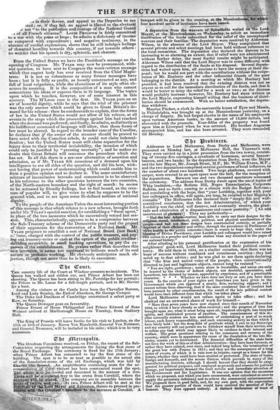From the United States we have the President's message on
the opening of Congress. Mr. TYLER may now be pronounced, with- out question, to have sent to Congress the worst-written message which that august body has ever received from the Chief Magis- trate. It is not so voluminous as many former messages have been ; but it is fully as prolix, as loosely constructed as any, and full of local vulgarisms, while the clumsiness of its style often ob- scures its meaning. It is the composition of a man who cannot concentrate his ideas or express them in fit language. The topics upon which he touches, however, are of some interest in this country. The M'Lson case is the first. Mr. TYLER puts on an air of boastful dignity, while he says that the trial of the prisoner was the only answer which could be given to Great Britain's de- mand-for his release : then he condescends to explain, that the forms of law in the United States would not allow of his release, at all events in the stage which the proceedings against him had reached when the demand was preferred; and finally, he admits, as distinctly as his indifferent command of language will allow, that those forms of law must be altered. In regard to the broader case of the Caroline, he declares that if the owner of the steamer should be proved to have acted with the Canadian rebels, he could not claim indemni- fication; but the United States must still claim reparation for the injury done to their territorial inviolability, the invasion of which could only be justified by "pressing necessity"; and he makes no doubt that Great Britain will renounce the precedent which she has set. In all this there is a see-saw alternation of assertion and admission, as if Mr. TYLER felt conscious of a demand upon his intelligence to see all sides of the question, and did his best, with- out having that power of understanding which could enable him to form a positive opinion and to declare it. The same unsatisfactory mixture of inconclusive bravado and concession is to be observed in his reference to the other questions between the two countries, of the North-eastern boundary and the right of search : he seems to be actuated by friendly feelings, but to feel bound, as the crea- ture of popular will, to give voice to what be supposes to be the general wish, and to act upon some ill-defined notions of national dignity.
To the people of the American Union the most interesting portion of this message is that which relates to a new scheme, brought forth under Mr. TYLER'S special sanction, for establishing a "fiscal agent," in place of the two measures which he successively vetoed last ses- sion. This, characteristically, appears to be a compromise between the Sub-Treasury scheme of the Democratic party and the project of their opponents for the restoration of a National Bank. Mi. TYLER proposes to establish a sort of National Board (not Bank) c: !ssue, charged with the control of the public treasure, and pay- ing out treasury-notes or cash at the option of the public creditor ; dabbling meanwhile in small banking operations, to pay the ex- penses of the establishment. He praises rather than describes this new invention, in terms too equivocal to indicate much of its real nature or preheble working. He obviously anticipates much ob- jection, though not more than he is likely to encounter.































 Previous page
Previous page